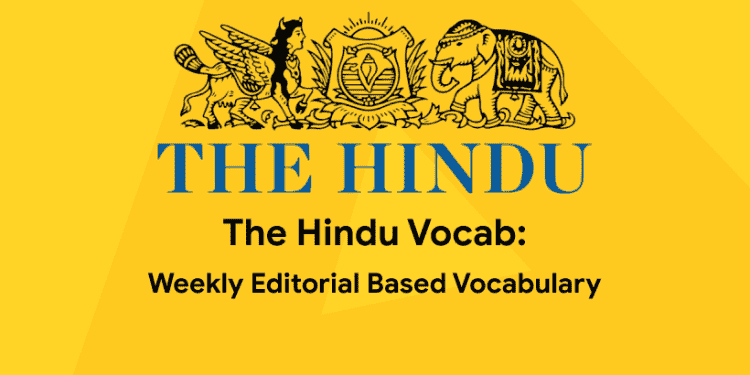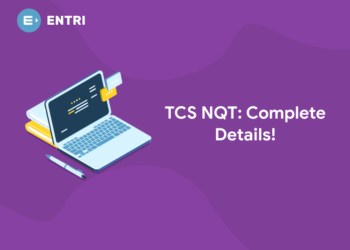We all know that the English language plays a crucial role in competitive exams like PSC, SSC, Banking exams etc. So if you are aiming to crack those examinations, you should have a strong command in your English language skills. Vocabulary is one of the most crucial topics of English subject. Vocabulary refers to all the words in a language that is known and used by a particular person. It is essential not only for competitive exams but it is the fundamental tool for communication and acquiring knowledge. In order to help you in improving your vocabulary skills, Entri will provide you with Weekly English Vocabulary based on The Hindu editorial every Friday. Reading the daily The Hindu editorial is highly recommended for candidates who are aspiring for competitive exams. In this blog, we have given some questions based on Vocabulary with answer and solutions. Check here for Weekly English Vocabulary Based on The Hindu Editorial 2020 March 27.
Get free Mock test for Government and Banking Exam!
Weekly English Vocabulary Based on The Hindu Editorial 2020 March 27
1. Directions: For each of the words given below, a contextual usage is provided. From the alternatives given, pick the word that is the most appropriate as a substitute in the given context.
Irresolute: Now, three years later, it is high time to break the stranglehold of its irresolute captor and to move on: with the Brits if possible, without them if necessary.
(a)Irksome
(b)Indecisive
(c)Irreverent
(d)Inveterate
(e)None of these
Solution:
Irresolute – uncertain how to act or proceed or showing or feeling hesitancy; uncertain. (Indecisive, hesitant, tentative)
2. Directions: For each of the words given below, a contextual usage is provided. From the alternatives given, pick the word that is the most appropriate as a substitute in the given context.
Imperturbable: Ordinarily imperturbable, even in the face of unexpected situations, he was now visibly agitated.
(c)Unflappable
(d)Benevolent
(e)None of these
Solution:
Imperturbable – not easily perturbed or excited or upset; marked by extreme calm and composure or unable to be upset or excited; calm. (Unflappable, self-possessed, composed)
3. Directions: For each of the words given below, a contextual usage is provided. From the alternatives given, pick the word that is the most appropriate as a substitute in the given context.
Succor: Given his health woes, succession worries and persistent isolation, Mr. Kim may simply be seeking succor from what may be his last friend on earth.
(d)Ministration
(e)None of these
Solution:
Succor – assistance in time of difficulty or help in a difficult situation. (Ministration, relief, guidance)
4. Directions: For each of the words given below, a contextual usage is provided. From the alternatives given, pick the word that is the most appropriate as a substitute in the given context.
Coy: She treated him to a coy smile of invitation.
(d)Simpering
Solution:
Coy – affectedly modest or shy especially in a playful or provocative way. (Demure, coquettish, simpering)
5. Directions: For each of the words given below, a contextual usage is provided. From the alternatives given, pick the word that is the most appropriate as a substitute in the given context.
Upbraid: When Kahn warned of a serious economic “depression”, he was upbraided by the White House for using such language.
Solution:
Upbraid – express criticism towards or find fault with someone; scold. (Reproach, reprimand, rebuke)
6. Directions: For each of the words given below, a contextual usage is provided. From the alternatives given, pick the word that is the most appropriate as a substitute in the given context.
Betoken: She wondered if his cold, level gaze betokened indifference or anger.
(c)Abnegate
(d)Denote
(e)None of these
Solution:
Betoken – be a signal for or a symptom of or indicate by signs. (Bespeak, indicate, denote, evident)
7. Directions: For each of the words given below, a contextual usage is provided. From the alternatives given, pick the word that is the most appropriate as a substitute in the given context.
Wry: In a wry poem of direct counsel, Ha Jin dismisses obligatory mingling and networking.
(a)Blatant
(b)Caucus
(c)Ironic
(d)Grudging
(e)None of these
Solution:
Wry – humorously sarcastic or mocking or using or expressing dry, especially mocking, humour. (Ironic, sarcastic, sardonic)
8. Directions: For each of the words given below, a contextual usage is provided. From the alternatives given, pick the word that is the most appropriate as a substitute in the given context.
Grudging: Some Republican senators voiced grudging admiration for the Democrats’ presentation.
(b)Eager
(c)Deleterious
(d)Niggard
(e)None of these
Solution:
9. Directions: For each of the words given below, a contextual usage is provided. From the alternatives given, pick the word that is the most appropriate as a substitute in the given context.
Rapt: You might assume that musicians in their 30s would bring youthful energy to bear, but I was struck by how often they opted for a raptly restrained tempo.
(d)Engraved
(e)None of these
Solution:
Rapt – feeling great rapture or delight or completely fascinated or absorbed by what one is seeing or hearing. (Enthralled, ecstatic, rapturous, rhapsodic)
10. Directions: For each of the words given below, a contextual usage is provided. From the alternatives given, pick the word that is the most appropriate as a substitute in the given context.
Voluble: Asked about their dismissals during an appearance last week at the Atlantic Council, a Washington think tank, the usually voluble Mr. O’Brien was curt.
(d)Loquacious
(e)None of these
Solution:
Voluble – marked by a ready flow of speech or talking fluently, readily, or incessantly. (Loquacious, garrulous, talkative)
We hope this blog was helpful for you in improving your knowledge in Vocabulary. Stay tuned with Entri for weekly vocabulary based on Hindu editorial, which will be published every Friday.
Get Higher Rank in Government and Banking Exams!












